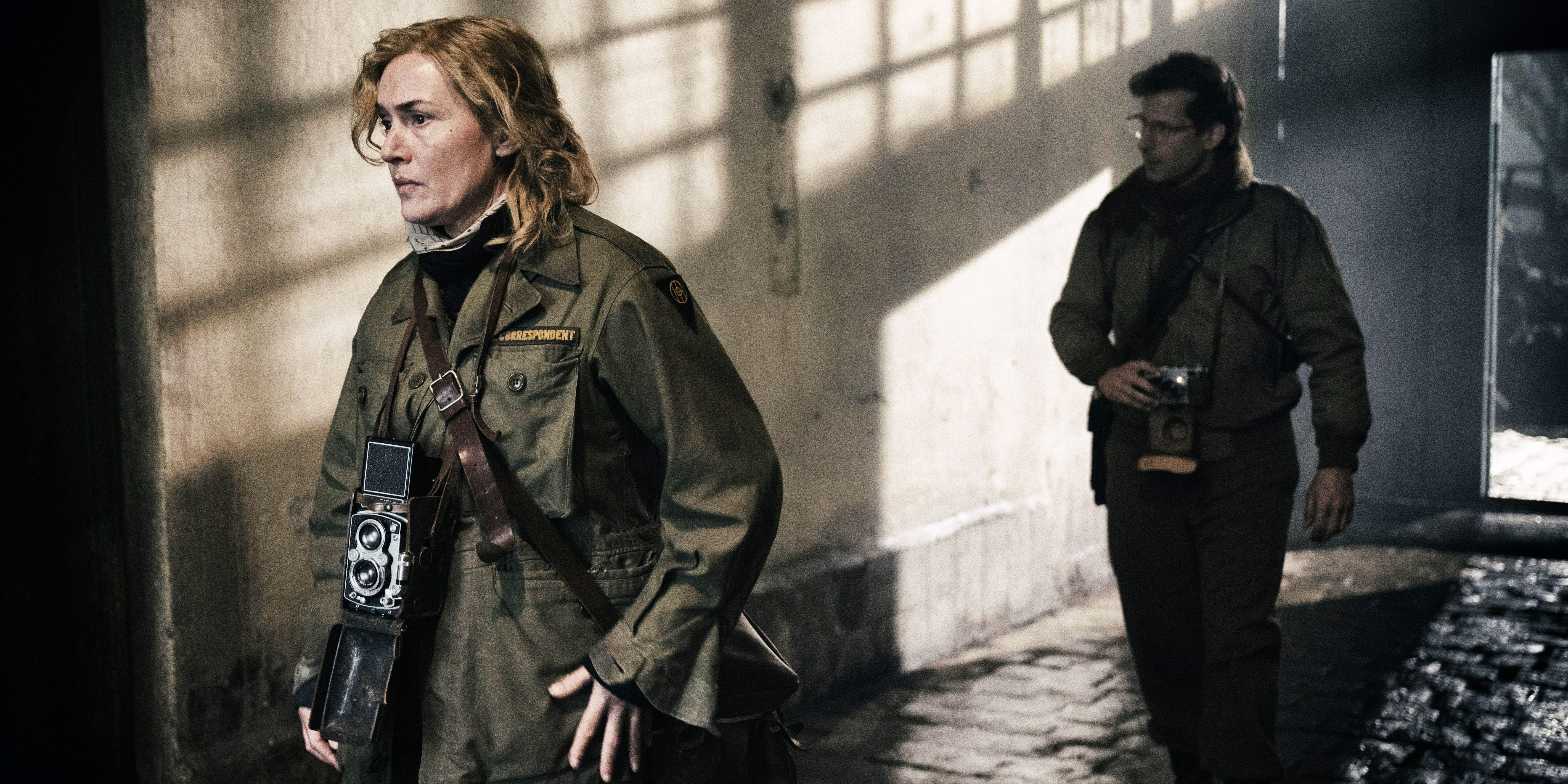Kate Winslet has had a long career, taking on diverse roles that have often been memorable. She’s always been outstanding, and that’s no different in Lee, in which she plays the titular Lee Miller, a model-turned-war photographer. Director Ellen Kuras’ film, which Liz Hannah, John Collee, and Marion Hume penned, doesn’t live up to Winslet’s performance. I felt detached from Lee’s life for much of the film. Characters come and go — including Marion Cotillard in a small, barely there role as Lee’s friend Solange — but they aren’t developed enough and are often paper-thin cutouts of real people.
Lee begins in an interview format. It’s 1977 and Antony (Josh O’Connor) sits opposite Lee, her pictures spread out before them. He asks her to tell him about herself, about the stories behind the pictures because he’s curious to know. She’s hesitant and promises to share, but only if he promises to tell her something about himself as well. When he agrees, Lee begins her story, starting pre-World War II and ending shortly after its conclusion. The biopic rarely cuts back to Lee and Antony, who is later revealed to be someone very important to her.
As A Biopic, Lee Doesn’t Offer Much
As a biopic, Lee feels methodical. Kuras doesn’t take any risks with the material, and there’s a general lack of emotion in the events of Lee’s life. She and her partner, Roland Penrose (Alexander Skarsgård), get together, but we don’t get a true sense of what their relationship is like. The same goes for Lee’s friendships — namely with Andy Samberg’s David Scherman, a fellow photojournalist, and her relationship with British Vogue editor Audrey Withers (Andrea Riseborough). Everyone seems to pass through, as though the film is trying to fit them all in but without doing the work to explore them.
The script goes through the motions as it pivots from Lee’s life before becoming a war correspondent to her work on the front lines. It’s chronologically told and there are some emotional, poignant beats, but what Lee is ultimately missing is heart. For such an interesting subject, the biopic is too standard. There’s no oomph and, at certain points, it takes itself too seriously. There is no insight into who Lee is outside of her job.
Lee’s got grit and utilizes that at various points, even saving a young woman from being assaulted. She watches horrific things happen around her while pointing her camera, and we see how these experiences affect her emotionally at a couple of points in the film. Still, you’ll be shocked to find there is little depth elsewhere. Lee is portrayed as a strong woman, but her biopic doesn’t present other sides to her. Her vulnerable side gets lost along the way. So much so that by the time the ending twist is revealed it’s too late for us to care.
Kate Winslet’s Performance Carries Lee
She’s The Reason To Watch
I wanted more from Lee — a better, well-rounded character examination, and a focus that wasn’t solely on her work, which somehow flattens other parts of her. And yet, I couldn’t look away from the film thanks to Winslet’s performance. The actress brings her versatility to a role that needed better writing. Winslet is able to embody Lee’s headstrong fervor for her photojournalism and the gentleness with which she handled her friends post-war. The fact she was willing to do what was necessary to get things done, regardless of what anyone said, was admirable and Winslet made sure we saw that.
Winslet’s got plenty of fire as the titular photographer, but the biopic’s spark quickly fades.
Skarsgård is always good, but he isn’t given much to do here. I was surprised by the small role for Cotillard, a wonderful actress who barely has five minutes of screen time. Lee’s world outside the war is limited because of the thinly drawn characters around her. Lee had potential, but it ended up being more of a war movie than a full-blown biopic. I really wanted to like the film, but I felt disengaged from the story. Winslet’s got plenty of fire as the titular photographer, but the biopic’s spark quickly fades.
Lee is now playing in theaters. The film is 116 minutes long and rated R for disturbing images, language, and nudity.

